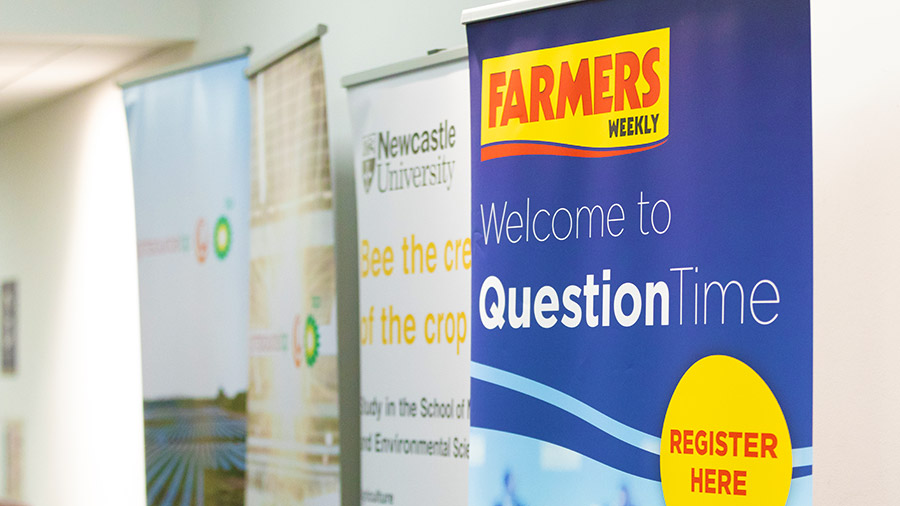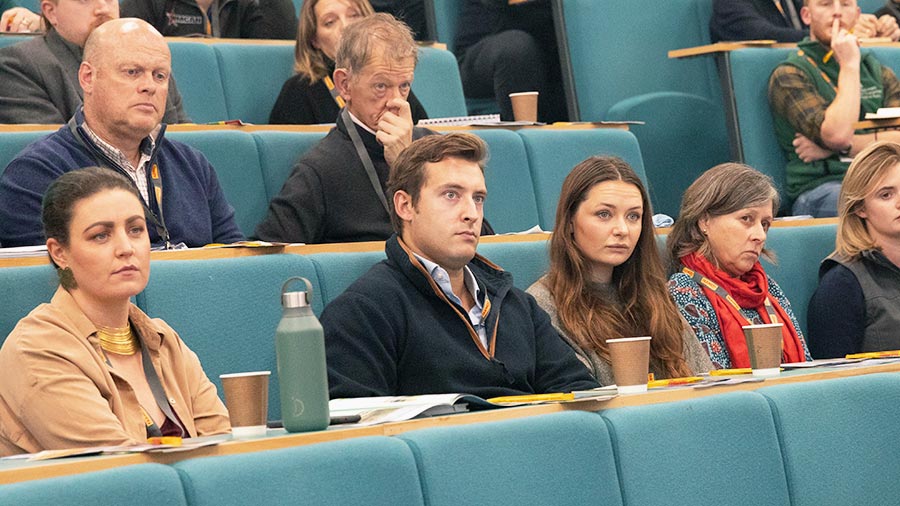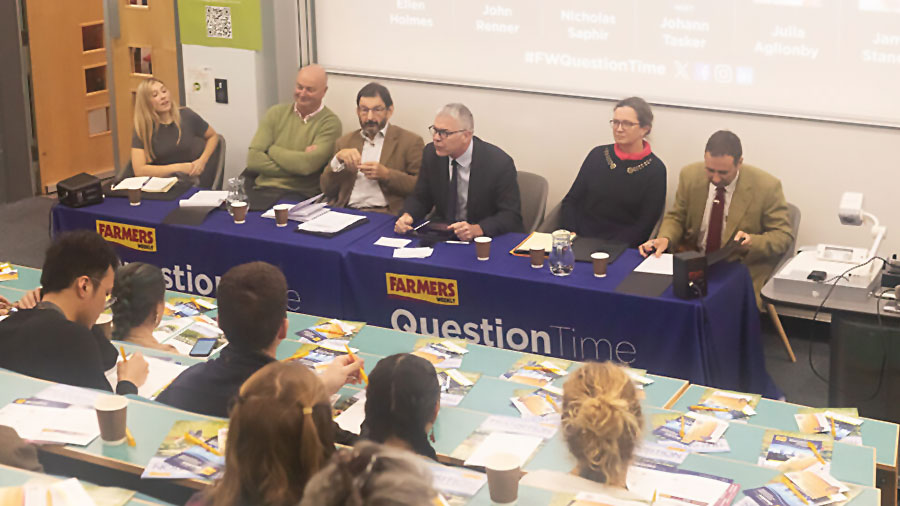Red Tractor and food security scrutinised at FW’s Question Time
 © Paul Martin Centre Stage Photo
© Paul Martin Centre Stage Photo Issues surrounding food security, the future of farming, and the role of Red Tractor were all discussed by an expert panel in front of a live audience at Newcastle University for the first Farmers Weekly Question Time of the series on 19 October.
The evening was chaired by Farmers Weekly podcast and projects editor Johann Tasker, and the panel included AHDB chairman Nicholas Saphir and Julia Aglionby, Liberal Democrat candidate for Penrith and Solway.
We’ve pulled together some of the best questions from the evening below and a recording of the event is available on the Farmers Weekly podcast as well as to watch in full below.
See also: Find out more about Question Time and register for an event
Is Red Tractor still fit for purpose?
AHDB chairman Nicholas Saphir said assurance is critical for our future, but it has to be proportionate. It has to offer a cost benefit and it has to be relevant, otherwise it won’t maintain the farmers who are the baseline to it.
“We, as AHDB, have just announced that we are doing studies on cereals and oilseeds, and sheep and beef in terms of assurance,” he said.
“Assurance is absolutely vital at a time when we are heading towards a very competitive world where we have to recognise that other countries have standards and many of them do assure. We have got to maintain that reputation,” he added.
Mr Saphir thought the problem for many farmers with the new environmental module announced by Red Tractor is that the voluntary scheme could morph into becoming a general base standard, which meant there wouldn’t be an additional payment for it.
“I think that is a worry for many people. And there are other parts of the module that need to be debated as well,” he said.
He added that, for cereals and oilseeds, there has been an ongoing question about the assurance standards British produce has to meet, which costs money, whereas imports don’t have to go through the same hoops.
Mr Saphir said: “We will be appointing independent consultants to AHDB to have a look at the real standards to which imports are controlled, what due diligence takes place and whether or not our assurance schemes are proportionate in dealing with that.
“That’s going to be an evidence-based piece of work by the end of this year, that’s going to allow the debate to happen properly, and that’s really important because it is festering.”
He also announced that the AHDB has embarked on a similar review for beef and lamb on whether international standards – in countries such as Australia, New Zealand, and America – are better or worse than in the UK.
Farmer view
Leaf demonstration farmer John Renner said he would never understand people knocking assurance schemes.
“Assurance schemes are there to protect the consumer at all costs, but also it should add value to the producer as well.
“I was fortunate enough for three years to sit on the technical advisory committee for the Leaf marque, and it opened my eyes to how assurance schemes are set up and laid out,” he said.
Mr Renner’s view was that farmers should look at assurance schemes as they’re going to add value and it can benefit all types of systems.
“We are going to be able to work closer with the new support schemes that are coming forward. If we start working with the environmental complexities which are being laid out by Red Tractor it will benefit us in the long term,” he concluded.
Liberal Democrat candidate Julia Aglionby was also “pro assurance” on her own farm, with accreditation for pasture fed livestock and Soil Association certification.
Ms Aglionby said she believed in the way she farms, and it also provides a premium as well as assurance to the customers she sells meat directly to.
She said: “The way Lib Dems see this is that, as a society, we should provide a framework and then we operate as farmers within that framework.
“That framework, which in most cases is Red Tractor, provides the basic standards, particularly with cross compliance gone.”
Ms Aglionby said it was really good to have green assurance, but Red Tractor had handled its green bolt-on appallingly.
“How they have done it is poor,” she said, “but the ‘what’ is a different matter.
“I am concerned how it will work and interact with SFI and ELM. What we know is the price we are paid, particularly in the red meat sector.
“This does not reflect all the public benefits that we, as farmers, produce. It’s really critical that society is not expecting all those public benefits on the cheap,” she concluded.
Audience comment
Livestock farmer Stephen Love said he doesn’t think any farmer will disagree with assurance, but it’s about the amount of time it takes spent on niggles to get the certification.
“It’s getting too detailed where its actually taking it away from the basics of how Red Tractor started.
“They used to just come out to the farm, check your stock, check your sheds and medicines, and if everything was fine you got it,” he said.

© Paul Martin Centre Stage Photo
How should we best support Britain’s hill farmers?
Ms Aglionby said business life is immensely tough for hill farmers and they are not being supported well.
She added that Defra itself acknowledges that it expects farm incomes in less-favoured areas to go down by 63%.
“What’s happening at the moment is completely unsatisfactory,” said Ms Aglionby.
“What we should be doing is rewarding people for what they are actually providing, so the scheme payments need to be significantly higher.
“We need stronger protection for tenants, stronger protection for commoners, and we need to pay them properly.”
Where can more support come from for smaller livestock farmers and small abattoirs?
Mr Saphir said the government did actually announce a small amount of money to local abattoirs recently, but nothing like enough.
“Government priorities are going to be other things such as the NHS, education, and infrastructure, so we have to change,” he added.
Mr Saphir believed that small farms and abattoirs play a role in protecting the rural economy and social structure.
Mr Renner added that farmers have got to be able to make money even when prices are at their lowest.
“We have brought our cost of production down to its knees. It comes down to how we manage our feed, how we manage our animals, becoming more sustainable, getting more produce out of the grass, using less fertilisers.
“How we control our rents, our mortgages, our interest rates, everything has got to be improved.”
Should British consumers be paying more for food?
Ellen Holmes, partnership co-ordinator at Food Newcastle, believes prices shouldn’t rise and it’s about thinking how we can reimagine the supply chain.
“We are not winning on either side of the supply chain – it’s the middle man that is hiking up the prices and creating the issues.”
Ms Holmes said there also isn’t the support on the cooking and nutrition side of food for consumers.
“Generally, I think it’s about how we can adapt the supply chain to better support both producers and consumers.”
Mr Standen felt that there needed to be more equity in the market and a fairer distribution of funds across the supply chain.
Mr Saphir pointed out that Great Britain has the second or third cheapest food in the developed world, with France and Germany spending 30% per capita more on food and drink.
“The reason we did not have cucumbers on the shelves last spring is because the cucumbers on the shelves in France were £1 more expensive than they were here,” he said.
“There is an issue as to whether we can sustain our cheap food policy in what is going to be a more volatile world.”
Mr Saphir added that retail margins are very tight and have dropped from 14% to between 2% and 3%.
Meanwhile, on farm, the dairy sector runs on average 2p/litre behind prices on the continent, according to Mr Saphir.
Ms Aglionby said the Basic Payment Scheme wasn’t a subsidy for farmers, it was a subsidy for consumers and cheap food.
“It’s really critical that we make sure that people have enough money to eat good food, and that means steadily increasing the minimum wage and that way people can afford to pay properly for their food.”
She believed that procurement in schools should be for British food, and that all children in primary schools should receive free school meals, as well as all children whose parents are on universal credit throughout their education.
Audience view
The audience was asked for a show of hands on whether they thought British consumers should be paying more.
It was a fairly split decision, with the audience leaning slightly in favour of consumers paying more for food.
Does this government care about food security?
Mr Renner did not think so. He believed the government had so many other things to think about that it just didn’t seem to be concerned.
Ms Holmes said a food strategy is essential, with 39% more food parcels handed out in Newcastle in March 2023 than the previous March.
Mr Standen worried that government doesn’t think about food security or recognise its importance.
“I think probably our job as farmers is to press upon current government and future MPs how important food security is, so they can actually deliver something.
“Whether that’s a national food strategy, or a rethinking of the schemes, I think it is very important we carry on lobbying government, making sure it recognises its importance,” he said.
Ms Aglionby said there was a level of complacency, and a need to encourage the right sort of food in the right place.
“Most mothers and fathers don’t give their children bad food because they want to, they give them it because they haven’t got the alternatives,” she added.
Mr Saphir thought it would be interesting to see how the prime minister could deliver his commitment to achieving 60% self-sufficiency.
“There was a high degree of complacency, in terms of the resilience of the food industry to be able to provide food during Covid and then during Ukraine. I think that [complacency] was shaken by what happened last spring.
“We need to differentiate between food security and self-sufficiency as they are two different subjects,” he concluded.
Is the future of farming regenerative?
Farming systems have got to change, according to Mr Standen.
“I think farmers will think about input and outputs a lot more and how those systems work. If they could do that in conjunction with nature that’s great, but I do think farming will change.”
Mr Renner believed farming is going to change hugely and it’s going to change very quickly.
“We have got to produce more with less, it has got to be better, and it’s got to have less impact on the environment,” he said.
Mr Saphir added that the world is changing, with farmers having to extract more from their inputs and they will have to do it in a sustainable way.

© Paul Martin Centre Stage Photo
What is happening with AHDB levy increases?
AHDB has spent the past three years doing everything that is absolutely necessary in terms of reducing costs and making sure it is as lean as possible, said Mr Saphir.
“We have now got to the point we have cut as far as we can, and we are saying to our sector boards ‘what is it you really need for the future?’
“Then, from a zero-based budget, let’s build it up to what that will cost and we have found that it will cost more than our current levy.”
The levy increases are currently out for consultation and feedback and, so far, the feedback says it is right to increase them, as long as the organisation performs, according to Mr Saphir.
Why do environmental schemes seem to reward the farmers who have done the least in the past?
Mr Standen said if it’s the government strategy that they want more land in the environmental schemes then they have got to encourage everyone.
However, he noted that it is slightly frustrating when you have done all the things you should be doing despite not being properly rewarded for it, and then someone else comes along and gets rewarded.
Mr Renner has been farming sustainably for 20 years already.
“We do everything to make sure that all our actions are improving the environment in which we are farming. But that runs alongside making sure we are producing more with less,” he said.
Should UK farmers be optimistic for the next decade and what skills are essential for young entrants?
Mr Standen said you need to be optimistic and look at things from a positive root, talk to other people, and learn what’s going on.
“I do worry about changes, but I think there will be opportunities out there and you need to put yourself in the right position to take advantage of them.”
Ms Aglionby said in terms of skills and attributes, you need an enormous amount of patience, energy, good mental health, and lots of support, and it’s a lot of hard work.
Mr Saphir believed food is going to matter more than ever, with markets growing and world consumption going up by 2% a year.
He outlined being inquisitive, determined, adaptable and optimistic as the key skills for success.
“I am optimistic for people who come into the industry with those views,” he said.
Mr Renner said never ever look over the hedge at what your neighbours are doing, have your own plan and go for it.
Ms Holmes concluded by saying it’s about connecting with communities and people you wouldn’t normally engage with.


